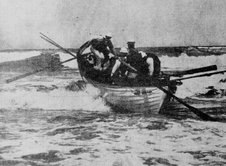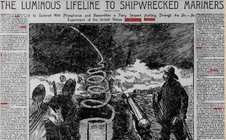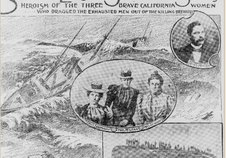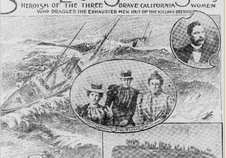Story from John Vonderlin
Email John ([email protected])

Hi June,
Here is some background information on the Life-saving Service, some photos of lifesaving efforts, official and otherwise. Enjoy. John

The United States Life-Saving Service was a United States government agency that grew out of private and local humanitarian efforts to save the lives of shipwrecked mariners and passengers. It began in 1848 and ultimately merged with the Revenue Cutter Service to form the United States Coast Guard in 1915.
The stations of the Service fell into three categories: lifesaving, lifeboat, and houses of refuge. Lifesaving stations were manned by full-time crews during the period when wrecks were most likely. On the East Coast, this was usually from November to April, and was called the “active season.” By 1900, the active season was year-round. Most stations were in isolated areas and crewmen had to perform open beach launchings. That is, they were required to launch their boats from the beach into the surf.
Before 1900, there were very few recreational boaters and most assistance cases came from ships engaged in commerce.

Nearly all lifeboat stations were located at or near port cities. Here, deep water, combined with piers and other waterfront structures, allowed launching heavy lifeboats directly into the water by marine railways on inclined ramps.
On January 28, 1915, President Woodrow Wilson signed the “Act to Create the Coast Guard,” merging the Life-Saving Service with the Revenue Cutter Service to create theUnited States Coast Guard. By the time the act was signed there was a network of more than 270 stations covering the Atlantic Ocean, Pacific Ocean, and Gulf of MexicoCoasts, and the Great Lakes.
http://www.lifesavingservice.org/ Website has history, pictures, etc. including this poem Monty Python could have used in their “Manly Men,” skits.
Perhaps this poem by Joe Lincoln sums up a Life-Saver:
He’s a rigger, rower, swimmer, sailor, undertaker,
And he’s good at every one of ’em the same,
And he risks his life for others in the quicksands and the breakers.
And a thousand wives and mothers bless his name.
He’s an angel dressed in oilskins, he’s a saint in a “sou’wester,
“He’s as plucky as they make, or ever can.
He’s a hero born and bred, but it hasn’t swelled his head,
And he’s jest the U.S. Government’s hired man.

